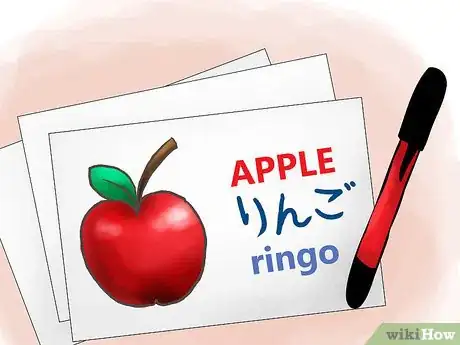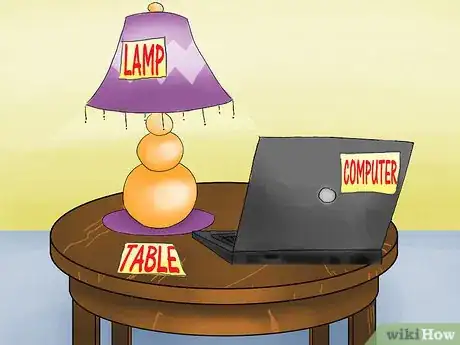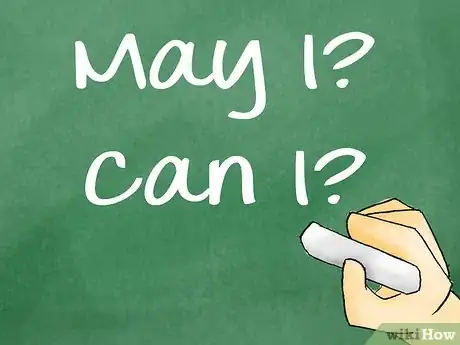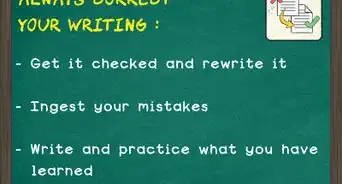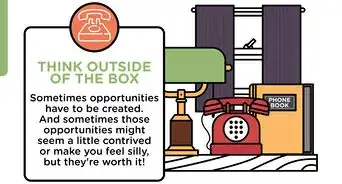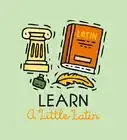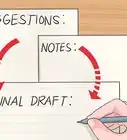This article was co-authored by Michelle Golden, PhD. Michelle Golden is an English teacher in Athens, Georgia. She received her MA in Language Arts Teacher Education in 2008 and received her PhD in English from Georgia State University in 2015.
There are 8 references cited in this article, which can be found at the bottom of the page.
wikiHow marks an article as reader-approved once it receives enough positive feedback. In this case, 94% of readers who voted found the article helpful, earning it our reader-approved status.
This article has been viewed 187,286 times.
Improving your studying skills when it comes to a tough language like English may seem like a difficult task. Luckily, there are plenty of tips and tricks to help you learn a language and English in particular, plus a handful of studying methods that are both enjoyable and helpful.
Steps
Buckling Down on the English Basics
-
1Make flashcards to build your vocabulary and grammar. Flashcards are a great way to increase your vocabulary and improve your understanding of English grammar, no matter your level of experience. Carry a set of cards with you wherever you go and run through the deck when you have a free minute. You can either make your own flashcards or buy a set.
-
2Label items in your home with sticky notes. Label a few household items with sticky notes every day to help you remember what these items are called. This is a fun and easy way to keep building your vocabulary every day.[1]
- For example, you could put a sticky note on your lamp, refrigerator, desk, computer, and dining room table.
Advertisement -
3Try Duolingo. Duolingo is a free online language learning application that is based on interactive, adaptive games that can help you learn vocabulary, grammar, and more.[2] Try to use the app for a little while every day to improve your vocabulary.
- You can make an account for free and use the app on your phone, computer, or tablet to help you practice your English.
-
4Get materials from the Guardian Teacher Network. The Guardian is an English language news source that makes learning materials available for free. They’ve done the research and compilation of English learning materials for you! Use these materials to get a handle on the basics, starting with the English alphabet.[3]
- The Big Grammar Book includes 101 printable grammar worksheets. It is useful for both beginners and more established English pupils. The worksheets were provided by EnglishBanana, a website that offers free worksheets and language-learning guides.
- The Big Resource Book and Big Activity Book are additional compilations of worksheets and lessons to help you learn English.
- Take advantage of the “toolkits” made available by the Guardian. These are provided by independent language professionals and include illustrated, specific lessons to help you learn English.
-
5Study for a focused amount of time every day. Set aside twenty minutes or even an hour to study. Park yourself somewhere away from a television, turn off your phone (unless you’re using it to help you study), and commit. Aside from traditional methods of studying, there a plenty of ways to study language, especially English.[4]
- If you’re in a class, revise any worksheets and other assignments when they are returned. Going back over previous homework is always worth your while. This will help keep knowledge fresh in your mind. Take note of anywhere you lost points, and adjust your answer to make it correct.
- Take free online quizzes. You can find unlimited vocab quizzes online, as well as quizzes and games that will test your English grammar comprehension, sentence construction, and more.[5]
- Use audio lessons. Especially if you spend a portion of each day in transit, get in the habit of listening to English lessons. This will help with all around language skills, including pronunciation.
-
6Study with a friend. Go through flashcards together or practice having simple conversations. Even if they are more advanced, you can learn a lot from a peer who already went through experiences and struggles that you’re having.
- Languages can be challenging to learn. Having the camaraderie of a friend to join you in the learning process can help even if you don’t formally work on coursework or materials together.
- If you’re in a class together, check each other’s homework. Not only will this improve your scores, it will also improve your comprehension.
- Having quick access to someone who may be able to answer questions will speed up your studying and make it more enjoyable. Sooner than later, they’ll have questions for you too!
-
7Watch for synonyms. English arguably has the most words of any language, which means that there are often multiple words with almost the same meaning. Even if a word is a synonym for another word, that does not mean the two words are interchangeable. Small differences in word meanings can make a big difference when you use the words.
- For example, the words "emaciated" and "thin" have similar meanings, but you would not use them interchangeably. Emaciated indicates that someone looks so thin that she seems unhealthy, while thin implies that one looks slim, yet still attractive and healthy.[6]
- Check the definition of synonyms before you decide to use them. This will help you to deepen your understanding of the English language while expanding your vocabulary as well.
-
8Memorize odd spellings. Inconsistent ways of spelling certain sounds can make learning English a bit frustrating. When you’re having trouble with a certain word, look at how it's spelled in other forms. This may even frustrate you further for a moment – but it will remind you that there are plenty of exceptions to English spelling rules, and you need to recognize this to master English.
- For example, some words feature silent letters, such as "knife" and "honor.”[7]
- There are also rules for vowel order in some cases, such as “i” before “e” most of the time- (but not always!) and replace the “y” and add “ies” for plural words.
-
9Identify subtle differences in verbs. Verbs can also be challenging when you are trying to learn English. There are many verbs in the English language that have similar meanings, but the meaning of a sentence can be quite different depending on the one you choose.[8]
- For example, “May I?” and “Can I?” have different (yet similar) meanings. “May” indicates that you are politely asking permission to do something, while “can” indicates that you are inquiring about whether or not something is possible.
- Get familiar with common verbs to avoid making these types of mistakes.
-
10Remember that spelling can be misleading. In spoken English, many words are not pronounced the same way even if they are spelled the same way. This means that you may end up making some mistakes with pronunciation.
- For example, the words “bough,” “tough,” and “cough” all end in the same four letters, but each word is pronounced differently.[9]
Practicing Speaking and Writing in English
-
1Speak English whenever you can. If you have a study partner that is also learning English, make a point of speaking to one another exclusively in English. This will sometimes be frustrating, but there’s no better practice than actually speaking the language you’re hoping to learn.
- Get a part-time job that requires you to speak English. Places that have a large amount of tourist clientele are ideal, as the global use of English ensures its use by many world travelers.[10]
- Since English is so common, you can likely practice your English in everyday conversations with strangers as well. For instance, when ordering food or buying something in a big city, greet the cashier in English. If they respond in English, you have a great chance to practice.
-
2Write in English casually. Outside of any formal coursework, make sure to practice writing in English, ideally about things you’re interested in or find meaningful. One easy option is to keep an English language journal, and simply write in it every evening. Talk about your day or something you've been thinking about.
-
3Practice both speaking and writing in online learning communities. If you don’t have a reliable speaking partner, you can always find one online. People are trying to learn English all over the world, and there are plenty of other people looking for a speaking partner! There are entire websites dedicated to helping people learn languages together.
- Use Speaky. Set up a free account on the Speaky website and find speaking partners based on shared interests. This site lets you chat through texts and audio and video calls. Speaky also offers a mobile app so you can practice speaking on the go.
- Check out Coeffee. Coeffee is another online language-learning community where you can play cooperative games that will help you learn English words and phrases.[13]
-
4Emphasize pronunciation. Read in English out loud, and look up words you’re unsure about pronouncing correctly. Though it may feel silly, practicing your pronunciation out loud is vital to truly mastering a language.[14]
- For extra silliness and creative inspiration, read English-language poetry or English translations of your favorite poems or stories out loud. Familiarizing yourself with English rhymes gives you extra clues as to certain words’ pronunciation.
- Record yourself speaking English. Listening to recordings of yourself will help you identify words and sounds you’re struggling with. A word could sound alright when you say it out loud, but you might notice a few mistakes when you hear yourself saying it.
Familiarizing Yourself with Everyday English
-
1Read something in English every day. Read from a book, newspaper, or online article in English. This will rapidly increase your English vocabulary, and help you learn how to write and speak about English culture and current events. Make a point of reading something – it doesn’t matter too much what you read – every single day.[15]
-
2Watch English movies and television shows. Listen closely to what the actors are saying. It may feel like they're speaking too fast at first, so feel free to pause the show or take breaks when you need to. This can be a fun way to increase your knowledge and familiarity with English without feeling like you are studying. You’ll pick up vocabulary and listening skills simply by watching![16]
- Check out some "slow English" podcasts as well. You can list to news podcasts that are delivered in slow, easy English to help you learn.[17]
- You can also listen to famous historical speeches that were given in English or watch English-language documentaries.
- Try watching without subtitles. If you don’t understand, watch with the subtitles on, but watch the actors themselves, and only read the subtitles when you aren’t able to follow along or are unsure of certain words.
- Pay attention to certain phrases that you may not be accustomed to, but may commonly be used by English-speaking people.
- Watch your favorite English-language movies again without the subtitles. Since you know what’s going on and may even remember some of the lines, you’ll facilitate English memory development.[18]
-
3Have fun, relax, and perform everyday activities in English. Play word games like Boggle or Scrabble. Hang around with English speaking people. Play your favorite English-language songs aloud and sing along.[19]
- Listen to radio stations that broadcast in English. If none are available in your area, look for some online. Choose a station that talks about things you're interested in.
- Reset your computer’s search engine to report English-language results. Searches may take you a little longer, but jumping in to a language like this - even if you're scared! - is a great way to learn.[20]
Community Q&A
-
QuestionWhat's the best way I can memorize new things?
 Community AnswerLook it up, write it down on a piece of paper, then keep that paper in a safe place. You could also keep saying the new thing in your head a certain number of times in your head.
Community AnswerLook it up, write it down on a piece of paper, then keep that paper in a safe place. You could also keep saying the new thing in your head a certain number of times in your head. -
QuestionWhich should I prioritize first: listening, reading, speaking, or writing?
 DonaganTop AnswererReading and listening come first. Writing and speaking, second.
DonaganTop AnswererReading and listening come first. Writing and speaking, second. -
QuestionHow can I improve my vocabulary?
 Community AnswerThe single best way to broaden your vocabulary is to read as often as you can. As you read, whenever you see a word that you don't understand or you don't know how to pronounce, copy it down and find the meaning yourself.
Community AnswerThe single best way to broaden your vocabulary is to read as often as you can. As you read, whenever you see a word that you don't understand or you don't know how to pronounce, copy it down and find the meaning yourself.
References
- ↑ https://www.oxford-royale.co.uk/articles/efl-learn-english-faster.html
- ↑ https://www.duolingo.com/
- ↑ http://www.theguardian.com/education/teacher-blog/2013/jun/18/teaching-resources-english-as-foreign-language
- ↑ https://www.oxford-royale.co.uk/articles/efl-learn-english-faster.html
- ↑ http://www.fluentu.com/english/blog/self-study-english/
- ↑ https://www.oxford-royale.co.uk/articles/efl-difficulties.html
- ↑ https://www.oxford-royale.co.uk/articles/efl-difficulties.html
- ↑ https://www.oxford-royale.co.uk/articles/efl-difficulties.html
- ↑ https://www.oxford-royale.co.uk/articles/efl-difficulties.html
- ↑ https://www.oxford-royale.co.uk/articles/efl-learn-english-faster.html
- ↑ http://www.5minuteenglish.com/learn-english-tips.htm
- ↑ https://www.oxford-royale.co.uk/articles/efl-learn-english-faster.html
- ↑ https://coeffee.com/login
- ↑ https://www.oxford-royale.co.uk/articles/efl-learn-english-faster.html
- ↑ http://www.5minuteenglish.com/learn-english-tips.htm
- ↑ http://www.5minuteenglish.com/learn-english-tips.htm
- ↑ http://newsineasyenglish.com/
- ↑ https://www.oxford-royale.co.uk/articles/efl-learn-english-faster.html
- ↑ http://www.fluentu.com/english/blog/self-study-english/
- ↑ https://www.oxford-royale.co.uk/articles/efl-learn-english-faster.html
About This Article
If you want to study the English language, make flashcards to build your vocabulary and grammar. The cards should have the English word on one side, and the same word in your native language on the other side. For even more practice, use sticky notes to label items around your home with their names in English. Once you start to learn basic vocabulary, read newspapers and books in English, and watch English-language TV shows and movies to help immerse yourself in the language. For tips from our reviewer on studying with a friend, read on!
